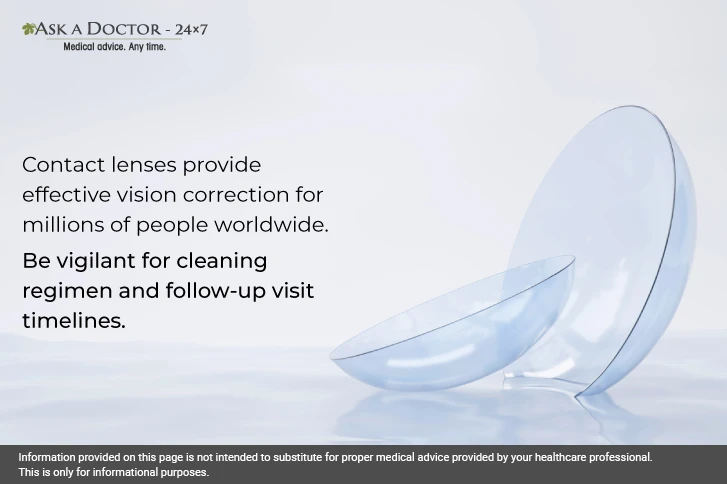5 Things To Consider If You Plan To Wear Contact Lenses
Have you been prescribed eyewear and wondering whether to opt for contact lenses for clear vision? You likely can wear contacts, just as long as you get your contact lenses examination done and take the necessary time to learn how to put them in, take them out, and take care of them.
Here in this blog, we have penned down all about contact lenses such as what is contact lenses, the pros and cons of wearing contact lenses, and also the safe handling techniques so that it becomes easy for you to decide. Read on...
What are Contact Lenses?

Contact lenses are tiny, thin, plastic, curved lenses that are placed directly on the eye to correct vision impairments. They provide a convenient way to correct your vision and offer freedom from bulky frames. Fashionistas and people involved in vigorous activities like sports often use them.
If you want to use contacts, the first step is to visit an eye doctor for a contact lens examination. Choosing contact lenses will depend on several factors, such as your age, lifestyle, and ability to clean your lenses.
Good Reasons for Wearing Contact Lenses
Contact lenses offer numerous benefits. Some of the positive sides of wearing contact lenses are:
- Provides a more natural look as it can be worn directly on the eyes.
- Boosts your self-confidence as they don’t obscure your face with frames
- Does not fog up or be affected by any reflections or distortions you get with eyeglasses.
- Moves in every direction with your eyes, giving you a field of focused vision.
- Helps during the rainy or cold season as you don’t get any water spots.
- Shows off your eye makeup and lash extensions which are lost while wearing glasses.
- Can be paired with the latest style of fashionable sunglasses and can carry off your looks.
- Helps to actively participate in sports and other physical activities.
- Fits in well as it is light, more comfortable, and convenient to wear than glasses.
Downsides of Wearing Contact Lenses
Contact lenses require much more care and maintenance than glasses like you need to:
- Clean and store contact lenses correctly and maintain hygiene meticulously.
- Get used to wearing and taking off contact lenses, which is time-consuming.
- Wear contact lenses every morning and take them out at night, which sometimes gets tedious.
- Use contact lenses only for a limited duration. Wearing for a long time may cause dryness, irritation, and discomfort.
- Remove your contact lenses in the swimming pool or hot tubs as the chances of getting a bacterial infection are high.
- Get custom fittings or frequent replacements which makes contact lenses more expensive, unlike regular glasses.
Besides the above, other common problems associated with contact lens use are innocuous eye infections and more severe vision-threatening eye ulcers. Also, contact lenses are unsuitable for people with eye problems such as dry eye, allergies, or corneal abnormalities.
Types of Contact Lenses
Contact lenses are of two types:
1. Soft contact lens
These are most popular as they are comfortable and contour to your eye shape. There are different types of soft contacts including:
- Daily wear contacts are worn throughout the day and cleaned at night.
- Daily disposables are worn just once.
- Extended-wear lenses can be worn overnight.
2. Hard contact lens
These are more durable but less comfortable.
5 Important Tips for Contact Lens Wearers to Ensure Healthy Vision
Read below 5 very important tips for wearing contact lenses to ensure that your eyes remain healthy and relaxed in the long term:
1. Always wash your hands before handling your contact lenses
Wash your hands with soap and water and dry them with a lint-free towel every time, before touching your contacts. Also, clean your contact lens case with a sterile solution and leave the empty case open to dry, each time you wear the lenses. If a case is not cleaned, layers of bacteria can build up and infect your reusable lenses.
2. Use fresh contact lens cleaning solution every time
Don't use water (tap or sterile), saliva, saline solution, or rewetting drops for cleaning, removing, and wearing lenses. Instead, use a fresh contact lens solution to clean and soak your lenses before and after each usage. Remember, if your lens comes in contact with water a corneal infection called Acanthamoeba keratitis can also occur. Therefore, always be mindful to remove your contact lens before bathing or swimming.
3. Stick to maximum wear time and replacement schedule
Using contact lenses beyond their recommended usage time can be potentially dangerous for your eyes. If you wear contacts for longer durations than the recommended timeline it can cause a decrease in oxygen flow to the cornea and degradation of the lens resulting in an open sore on your cornea. This may threaten your eyesight too.
Be it daily disposables or monthly contacts, wear them for not more than eight hours a day.
4. Replace contact lenses timely, per prescription
Depending on the type of lens, replacement is scheduled either weekly, bi-weekly, or monthly basis. To maintain optimal eye health, never be tempted to wear your expired contact lenses even for once as it can scratch your eye. You need to follow the replacement schedule even if you do not wear contacts regularly as they start to degrade once taken out of the sterile package. To safely wear contact lenses, you must take care of them meticulously using lens cleaning solutions.
5. Give Your Eyes 1-Day Break in a Week from Contact Lenses
Contact lenses can cause the eyes to become dry, red, and irritated if you choose to carry them without taking any break day. Yes, it's highly important to take a day break from contacts and let your eyes breathe and recover from the stress of contact lens wear. By giving your eyes a day break you can also help prevent the buildup of bacteria and other microorganisms that can lead to serious eye infections.
Remember, taking at least one day off from contacts is a small but important step in maintaining good eye health and ensuring that your contact lens wear is comfortable and hassle-free.
Conclusion
Contact lenses offer better cosmetics and are used worldwide as an alternative to spectacles for correcting eye refractive errors or as a fashion accessory. Your quality of life can be significantly improved with contact lenses. To learn more about contact lenses and issues related to them, or to check your prescription is still on, Ask an Ophthalmologist at Ask a Doctor 24x7. Our team of globally certified eye specialists is just a click away.
Recently Answered Queries Related to Contact Lenses and Vision Care
- Can I Switch From RGP Contact Lenses To Astigmatism Soft Lenses While Suffering From Nystagmus?
- What Causes Dryness And Tiredness Of Eyes After Using Contact Lenses?
- Suggest Treatment For Seasonal Allergy And IOP Dysfunction
- Suggest Ways To Relax Eyes After Discomfort Caused By Dryness And Itching After Wearing Contact Lenses?
- Suggest Treatment For Stuck Contact Lens In Left Eye
- Can I Use Contact Lens?
- What Causes Redness Round The Eyes In People Using Contact Lens?
- Having Cylindrical Power In Both Eyes. Using Contact Lens. Can I Correct My Vision?
- Suggest The Type Of Contact Lens To Be Used To Correct Vision
- Are RGP Contact Lenses Safe?
Disclaimer: Information provided on this page is not intended to substitute for proper medical advice provided by your healthcare professional. This is only for informational purposes.
Ask a Specialist
Recent Questions


